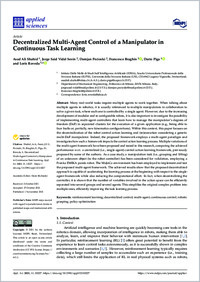Decentralized multi-agent control of a manipulator in continuous task learning
- Shahid, Asad Ali Istituto Dalle Molle di studi sull'intelligenza artificiale (IDSIA), Facoltà di scienze informatiche, Università della Svizzera italiana, Svizzera
- Sesin, Jorge Said Vidal Department of Mechanical Engineering, Politecnico di Milano, Milano, Italy
- Pecioski, Damjan Department of Mechanical Engineering, Politecnico di Milano, Milano, Italy
- Braghin, Francesco ORCID Istituto Dalle Molle di studi sull'intelligenza artificiale (IDSIA), Facoltà di scienze informatiche, Università della Svizzera italiana, Svizzera
- Piga, Dario ORCID Istituto Dalle Molle di studi sull'intelligenza artificiale (IDSIA), Facoltà di scienze informatiche, Università della Svizzera italiana, Svizzera
- Roveda, Loris ORCID Istituto Dalle Molle di studi sull'intelligenza artificiale (IDSIA), Facoltà di scienze informatiche, Università della Svizzera italiana, Svizzera
- 2021
Published in:
- Applied sciences. - 2021, vol. 11, no. 21, p. 10227
Reinforcement learning
Decentralized control
Multi-agent
Continuous control
Robotic grasping
Policy optimization
English
Many real-world tasks require multiple agents to work together. When talking aboutmultiple agents in robotics, it is usually referenced to multiple manipulators in collaboration tosolve a given task, where each one is controlled by a single agent. However, due to the increasingdevelopment of modular and re-configurable robots, it is also important to investigate the possibilityof implementing multi-agent controllers that learn how to manage the manipulator’s degrees offreedom (DoF) in separated clusters for the execution of a given application (e.g., being able toface faults or, partially, new kinematics configurations). Within this context, this paper focuses onthe decentralization of the robot control action learning and (re)execution considering a genericmulti-DoF manipulator. Indeed, the proposed framework employs a multi-agent paradigm andinvestigates how such a framework impacts the control action learning process. Multiple variations ofthe multi-agent framework have been proposed and tested in this research, comparing the achievedperformance w.r.t. a centralized (i.e., single-agent) control action learning framework, previouslyproposed by some of the authors. As a case study, a manipulation task (i.e., grasping and lifting)of an unknown object (to the robot controller) has been considered for validation, employing aFranka EMIKA panda robot. The MuJoCo environment has been employed to implement and testthe proposed multi-agent framework. The achieved results show that the proposed decentralizedapproach is capable of accelerating the learning process at the beginning with respect to the single-agent framework while also reducing the computational effort. In fact, when decentralizing thecontroller, it is shown that the number of variables involved in the action space can be efficientlyseparated into several groups and several agents. This simplifies the original complex problem intomultiple ones, efficiently improving the task learning process.
- Collections
- Language
-
- English
- Classification
- Computer science and technology
- License
- Open access status
- gold
- Identifiers
-
- DOI 10.3390/app112110227
- ARK ark:/12658/srd1321041
- Persistent URL
- https://n2t.net/ark:/12658/srd1321041
Statistics
Document views: 159
File downloads:
- Roveda_2021_MDPI_applsci: 186
